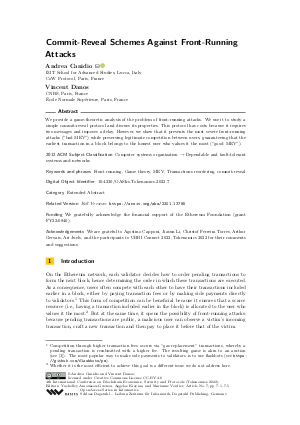Commit-Reveal Schemes Against Front-Running Attacks (Extended Abstract)
Authors
Andrea Canidio  ,
Vincent Danos
,
Vincent Danos
-
Part of:
Volume:
4th International Conference on Blockchain Economics, Security and Protocols (Tokenomics 2022)
Part of: Series: Open Access Series in Informatics (OASIcs)
Part of: Conference: International Conference on Blockchain Economics, Security and Protocols (Tokenomics) - License:
 Creative Commons Attribution 4.0 International license
Creative Commons Attribution 4.0 International license
- Publication Date: 2023-07-24
File

PDF
OASIcs.Tokenomics.2022.7.pdf
- Filesize: 482 kB
- 5 pages
Document Identifiers
Related Versions
- Full Version https://arxiv.org/abs/2301.13785
Subject Classification
ACM Subject Classification
- Computer systems organization → Dependable and fault-tolerant systems and networks
Keywords
- Front running
- Game theory
- MEV
- Transactions reordering
- commit-reveal
Metrics
- Access Statistics
-
Total Accesses (updated on a weekly basis)
0Document
0Metadata
Abstract
We provide a game-theoretic analysis of the problem of front-running attacks. We use it to study a simple commit-reveal protocol and discuss its properties. This protocol has costs because it requires two messages and imposes a delay. However, we show that it prevents the most severe front-running attacks ("bad MEV") while preserving legitimate competition between users, guaranteeing that the earliest transaction in a block belongs to the honest user who values it the most ("good MEV").
Cite As Get BibTex
Andrea Canidio and Vincent Danos. Commit-Reveal Schemes Against Front-Running Attacks (Extended Abstract). In 4th International Conference on Blockchain Economics, Security and Protocols (Tokenomics 2022). Open Access Series in Informatics (OASIcs), Volume 110, pp. 7:1-7:5, Schloss Dagstuhl – Leibniz-Zentrum für Informatik (2023)
https://doi.org/10.4230/OASIcs.Tokenomics.2022.7
BibTex
@InProceedings{canidio_et_al:OASIcs.Tokenomics.2022.7,
author = {Canidio, Andrea and Danos, Vincent},
title = {{Commit-Reveal Schemes Against Front-Running Attacks}},
booktitle = {4th International Conference on Blockchain Economics, Security and Protocols (Tokenomics 2022)},
pages = {7:1--7:5},
series = {Open Access Series in Informatics (OASIcs)},
ISBN = {978-3-95977-274-7},
ISSN = {2190-6807},
year = {2023},
volume = {110},
editor = {Amoussou-Guenou, Yackolley and Kiayias, Aggelos and Verdier, Marianne},
publisher = {Schloss Dagstuhl -- Leibniz-Zentrum f{\"u}r Informatik},
address = {Dagstuhl, Germany},
URL = {https://drops.dagstuhl.de/entities/document/10.4230/OASIcs.Tokenomics.2022.7},
URN = {urn:nbn:de:0030-drops-184241},
doi = {10.4230/OASIcs.Tokenomics.2022.7},
annote = {Keywords: Front running, Game theory, MEV, Transactions reordering, commit-reveal}
}
Author Details
Funding
We gratefully acknowledge the financial support of the Ethereum Foundation (grant FY22-0840).
Acknowledgements
We are grateful to Agostino Capponi, Jiasun Li, Christof Ferreira Torres, Arthur Gervais, Ari Juels, and the participants to UBRI Connect 2022, Tokenomics 2022 for their comments and suggestions.
References
-
Lorenz Breidenbach, Phil Daian, Florian Tramèr, and Ari Juels. Enter the hydra: Towards principled bug bounties and exploit-resistant smart contracts. In 27th USENIX Security Symposium (USENIX Security 18), pages 1335-1352, 2018.

- Andrea Canidio and Vincent Danos. Commitment against front running attacks, 2023. URL: https://arxiv.org/abs/2301.13785.
- Philip Daian, Steven Goldfeder, Tyler Kell, Yunqi Li, Xueyuan Zhao, Iddo Bentov, Lorenz Breidenbach, and Ari Juels. Flash boys 2.0: Frontrunning, transaction reordering, and consensus instability in decentralized exchanges. arXiv preprint, 2019. URL: https://arxiv.org/abs/1904.05234.
-
Joshua S Gans and Richard T Holden. A solomonic solution to ownership disputes: An application to blockchain front-running. Technical report, National Bureau of Economic Research, 2022.

- Lioba Heimbach and Roger Wattenhofer. Sok: Preventing transaction reordering manipulations in decentralized finance. arXiv preprint, 2022. URL: https://arxiv.org/abs/2203.11520.
-
John Nash. Equilibrium points in n-person games. Proceedings of the national academy of sciences, 36(1):48-49, 1950.

